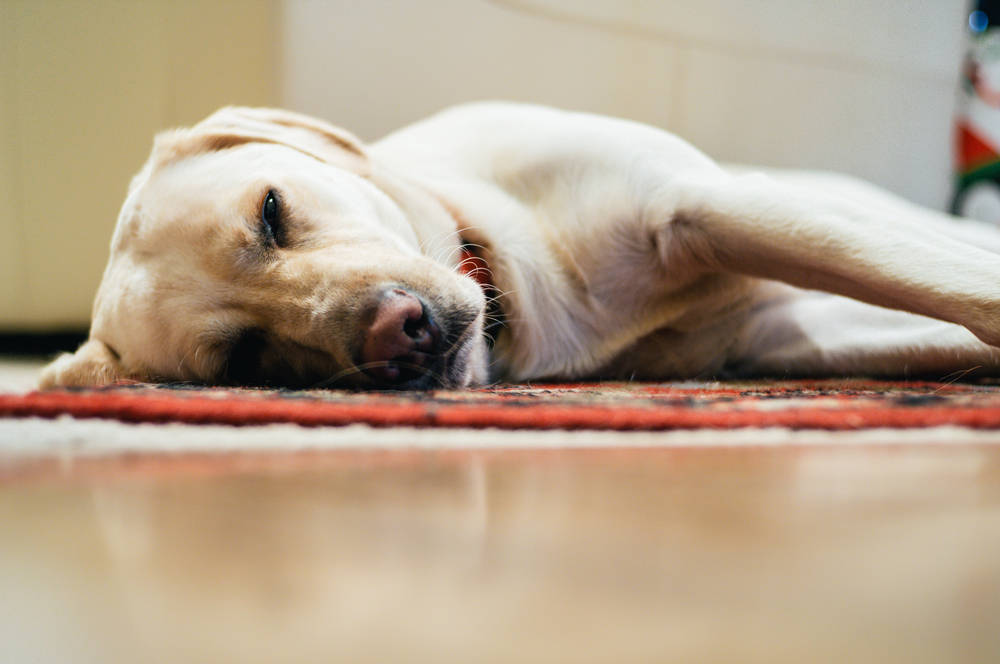[ad_1]
We all need and enjoy sleep. It gives our body a welcome rest from the tensions and worries of the day, and it’s no different with our canine companions, although they rest longer than people, averaging 10–12 hours daily in multiple bouts. Domestic dogs tend to follow a diurnal circadian rhythm, with most activity typically occurring during light periods, whereas rest is most frequent at night. However, as they are polyphasic sleepers, sleeping bouts are also observed during the day. Interestingly, it’s another adaptation of domestication as their ancestors were likely crepuscular, like present-day wolves.
Like humans, dogs have a pattern to their rest, with periods of deep sleep and others characterized by rapid eye movements (REM) and dreams. Your dog may twitch their paws, bark, or even growl in their sleep, not unlike how humans sometimes talk or make noises as they doze off. Whimpering is another common vocalization for dogs during sleep. It could be something benign, such as the events of the day, but it can also warrant further investigation.

The 6 Common Reasons Dogs Whimper in Their Sleep
1. A Stressful Day
Dogs are capable of basic emotions like joy and love. They can also feel anger, disgust, and fear. How your dog experiences their day can affect their sleep, which can include whimpering in the night. Research has shown that the pendulum can swing both ways, either positive or negative. The latter often causes a shorter sleep latency or the time it takes to fall asleep. Their sleep patterns may also change.
While that may sound good, it can actually be an indication of poor sleep quality, which is evident in how sleepy the animal is because of mental and physical exhaustion.

2. Lack of Sleep
Stress and sleep deprivation can wreak havoc on a human’s or dog’s quality of sleep. That may cause either one of you to cry out or whimper. Whether chronic or acute, these conditions may also play a role in sleep architecture, affecting the periods of wakefulness.
It boils down to what the animal experienced during the day and how long they’ve been without sleep. We mentioned how dogs sleep in multiple phases. An active household may keep your dog awake longer than usual during the day, leading to sleep disruptions at night.
3. Making Memories
We know dogs can remember things through classical or operant conditioning, whether the response is involuntary or voluntary. Part of that process involves sleep. Research has shown that memory consolidation in canines is similar to sleep-dependent forces in humans. The whimpering you hear your dog making during sleep may be your pet rehearsing the new trick you taught them, for example.
4. Feeding Schedule
The conventional wisdom is to feed your dog twice daily. It’s advised for dogs susceptible to bloat to prevent them from gulping all their food in one go. Once or twice daily feedings may also affect how your pet sleeps. You may think twice-a-day meals would help your pet sleep longer. However, research has shown that these dogs go to sleep earlier but also wake up earlier with shorter rest periods.
So, your dog’s feeding schedule may influence their sleeping patterns, leading to REM sleep and whimpering.

5. Pain
We have to address the elephant in the room with whimpering in their sleep. A resting dog might be less mindful of pain-inducing actions while dreaming. Their cries may reflect their discomfort. That may be especially true in senior pets or those with osteoarthritis.
6. Illness
Whimpering during sleep can also be an indication of other underlying medical conditions like neurological disorders. One small study identified an unusual change in dog behavior following treatment for tetanus. Some dogs developed signs consistent with REM sleep behavior disorder (RBD) causing violent episodes, sometimes resembling seizures. We wouldn’t be surprised if whimpering was also happening during these times.


Tips for Handling a Whimpering Dog
If you hear your dog whimpering while asleep, don’t try to wake up your pet. If they are having a violent nightmare, they may displace their fear onto you. Instead, coax your pooch awake by speaking to them softly. They’ll pick up on the sound of your voice and wake up without being startled or putting you in harm’s way.
If whimpering is a common occurrence, we suggest discussing the matter with your vet. Poor sleep quality is a significant concern with its potential health impacts. The other worry rests with mental health issues that could be causing undue anxiety or stress in your pet. Ruling out cognitive disorders is another factor.
💛 🐶 Speak To a Vet Online From the Comfort of Your Couch!

If you need to speak with a vet but can’t get to one, head over to PangoVet. It’s an online service where you can talk to a vet online and get the personalized advice you need for your pet — all at an affordable price!

Conclusion
No one likes to hear a dog whimpering. It’s instinctive for humans to want to comfort an animal in distress. Vocalizing during sleep may be your dog dreaming about something that occurred during the day and is not a cause for concern. However, frequent episodes require further investigation to rule out medical problems. A safe and loving home can go a long way toward restful sleep, but you should also rule out any health issues to be safe.
Featured Image Credit: Iryna Kalamurza, Shutterstock
[ad_2]
Source link
